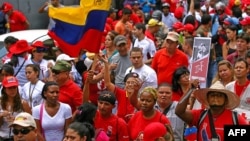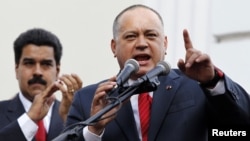CARACAS —
Most Venezuelans expect President Hugo Chavez to recover from cancer and return to active rule even though he has been in hospital and virtually unseen for two-and-a-half months, a poll showed on Tuesday.
Local pollster Hinterlaces said 60 percent of interviewees believe Chavez will be cured and back to governing, while 14 percent think he will recover but be unable to rule again, and 12 percent view his state as incurable.
Chavez, 58, underwent a fourth operation for cancer in Cuba on December 11. Last week he returned to Venezuela and was whisked to a military hospital in Caracas.
Apart from four photos of him in hospital in Havana, the socialist president has not been seen or heard in public, with even friend and ally Evo Morales, the president of Bolivia, unable to enter his room on two hospital visits.
The surprisingly optimistic view of Venezuelans - in contrast to a more pessimistic consensus among diplomats and analysts that Chavez's 14-year rule is probably nearing its end - came in the presentation of two recent surveys by Hinterlaces.
"Far from weakening 'Chavismo,' far from reducing the popular support for President Chavez, his absence and illness have strengthened the bonds of affection and identification with the president's ideals," Hinterlaces head Oscar Schemel said.
Previously released results from the same surveys showed that if Chavez is forced out, his vice president and preferred successor, Nicolas Maduro, is favored to win an election in a possible match-up against opposition leader Henrique Capriles.
Hinterlaces gave Maduro 50 percent of potential votes, compared with 36 percent for Capriles.
The opposition leader has publicly accused Hinterlaces of pro-government bias, and political polls in Venezuela are notoriously controversial and divergent.
The survey also showed that 60 percent of people view the devaluation of the bolivar currency earlier this month as negative for Venezuela. But the government otherwise scored high marks for its social welfare policies and ability to improve lives.
Accused by the opposition of lying and putting a gloss on Chavez's state, officials are urging Venezuelans to be patient.
"The president has the right to take whatever time he needs to recover ... We have the patience to wait for him, to understand him and to accompany him in his battle for life," Foreign Minister Elias Jaua said on Tuesday. "We can't succumb to the blackmailing of the right-wing - and its cruelty and inhumanity - which is clamoring for the president to appear, to intervene, to be sworn in right now."
Chavez missed his scheduled January swearing-in for the new, six-year term he won in last year's presidential poll.
Local pollster Hinterlaces said 60 percent of interviewees believe Chavez will be cured and back to governing, while 14 percent think he will recover but be unable to rule again, and 12 percent view his state as incurable.
Chavez, 58, underwent a fourth operation for cancer in Cuba on December 11. Last week he returned to Venezuela and was whisked to a military hospital in Caracas.
Apart from four photos of him in hospital in Havana, the socialist president has not been seen or heard in public, with even friend and ally Evo Morales, the president of Bolivia, unable to enter his room on two hospital visits.
The surprisingly optimistic view of Venezuelans - in contrast to a more pessimistic consensus among diplomats and analysts that Chavez's 14-year rule is probably nearing its end - came in the presentation of two recent surveys by Hinterlaces.
"Far from weakening 'Chavismo,' far from reducing the popular support for President Chavez, his absence and illness have strengthened the bonds of affection and identification with the president's ideals," Hinterlaces head Oscar Schemel said.
Previously released results from the same surveys showed that if Chavez is forced out, his vice president and preferred successor, Nicolas Maduro, is favored to win an election in a possible match-up against opposition leader Henrique Capriles.
Hinterlaces gave Maduro 50 percent of potential votes, compared with 36 percent for Capriles.
The opposition leader has publicly accused Hinterlaces of pro-government bias, and political polls in Venezuela are notoriously controversial and divergent.
The survey also showed that 60 percent of people view the devaluation of the bolivar currency earlier this month as negative for Venezuela. But the government otherwise scored high marks for its social welfare policies and ability to improve lives.
Accused by the opposition of lying and putting a gloss on Chavez's state, officials are urging Venezuelans to be patient.
"The president has the right to take whatever time he needs to recover ... We have the patience to wait for him, to understand him and to accompany him in his battle for life," Foreign Minister Elias Jaua said on Tuesday. "We can't succumb to the blackmailing of the right-wing - and its cruelty and inhumanity - which is clamoring for the president to appear, to intervene, to be sworn in right now."
Chavez missed his scheduled January swearing-in for the new, six-year term he won in last year's presidential poll.













